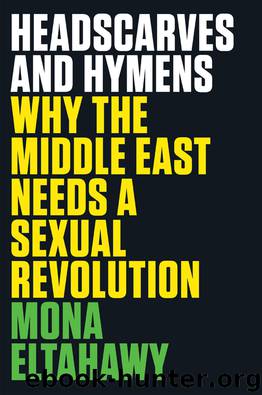Headscarves and Hymens by Mona Eltahawy

Author:Mona Eltahawy [Eltahawy, Mona]
Language: eng
Format: epub
ISBN: 9781443437981
Publisher: HarperCollins Canada
Published: 2015-08-14T16:00:00+00:00
Not only does the medicalization of FGM give legitimacy to a harmful practice but it has also added racism to the mix. The Orchid Project quotes a 2011 BBC report from Egypt: “Of medicalisation, community members said how they are advanced and different from ‘black Africa’ as they aren’t practicing FGC in a barbaric or unhygienic way.” Never mind that several of those countries in “black Africa,” such as Senegal, had made great progress in radically reducing rates of FGM.
The Orchid Project said that anti-FGM work in Egypt had begun in 1904—that’s 110 years of failure. In those 110 years we have “succeeded” in saving just 25 percent of our girls from having their genitals butchered unnecessarily.
I’ve blamed the Arab world’s toxic mix of culture and religion for many of the examples of misogyny I cite in this book. Female genital mutilation is such a difficult practice to eradicate precisely because those two behemoths underpin it. Although both Muslim and Christian girls are subjected to FGM, activists have long complained chiefly of the mosque preachers who instruct their communities that it is their religious duty to cut their daughters.
We Muslims turn ourselves inside out trying to distance ourselves from any Islamic connection to FGM—just as we do with domestic violence—when clearly there are some (too many) who give it a religious justification. Although the Mufti of Egypt joined the Coptic Pope to support the 2008 criminalization and to stress that FGM is required by neither Islam nor Christianity, his words have not sunk in. For some, the Mufti is considered compromised because he’s state-appointed, so he is seen as saying whatever the regime wants him to say. For others, his words are one rock thrown against a wall of religious support for FGM.
Muslim scholars have differed on whether any form of genital cutting is required, recommended, or optional based on two controversial sayings by the Prophet. Those sayings are considered weak and of little credibility by some scholars because they seem to be in contradiction to the Qur’an, which itself does not mention any form of genital cutting for women. In fact, passages from the Qur’an and Hadith advocate for women’s sexual satisfaction. Both the Qur’an and the Prophet Muhammad discuss foreplay, and describe sex between a husband and a wife as something to be enjoyed by both; the Wasa’il Hadith even states that omitting foreplay is “cruel” (Wasa’il, vol. 14, p. 40). Isn’t that Islam, too? Why is it not a religious duty to make sex between a husband and wife enjoyable, and therefore a sin to do anything to prevent such enjoyment, including hacking off the very part of a woman’s genitals that would provide her pleasure?
Instead, scholars of the Shafi’i school (one of the four Sunni law schools of Islam) interpret those two dubious Hadiths to allow what is known as the “Sunnah circumcision,” in which the prepuce (retractable fold of skin or hood) and/or the tip of the clitoris is removed. That is supposed to be
Download
This site does not store any files on its server. We only index and link to content provided by other sites. Please contact the content providers to delete copyright contents if any and email us, we'll remove relevant links or contents immediately.
The Lost Art of Listening by Michael P. Nichols(6456)
Why I Am Not A Calvinist by Dr. Peter S. Ruckman(3765)
The Rosicrucians by Christopher McIntosh(3041)
Wicca: a guide for the solitary practitioner by Scott Cunningham(2700)
Signature in the Cell: DNA and the Evidence for Intelligent Design by Stephen C. Meyer(2492)
Real Sex by Lauren F. Winner(2465)
The Holy Spirit by Billy Graham(2405)
To Light a Sacred Flame by Silver RavenWolf(2349)
The End of Faith by Sam Harris(2276)
The Gnostic Gospels by Pagels Elaine(2021)
Nine Parts of Desire by Geraldine Brooks(2001)
Waking Up by Sam Harris(1950)
Heavens on Earth by Michael Shermer(1950)
Devil, The by Almond Philip C(1895)
Jesus by Paul Johnson(1881)
The God delusion by Richard Dawkins(1841)
Kundalini by Gopi Krishna(1819)
Chosen by God by R. C. Sproul(1754)
The Nature of Consciousness by Rupert Spira(1686)
